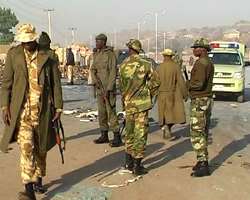Boko Haram: Over 20,000 Gwoza Residents Flee Nigeria Over JTF Attacks

SAN FRANCISCO, July 02, (THEWILL) – Over 20,000 residents of various communities in the Gwoza Local Government Area of Borno State have fled the area, vowing never to return.
Their decision followed the alleged killing of 13 members of the communities by men of the military Joint Task Force (JTF) who stormed the area in search of fleeing Boko Haram insurgents.
The residents, who are currently taking refuge in neighbouring Cameroon, fled their communities in Nigeria about two weeks ago.
Condemning what they described as the high-handedness of the JTF who invaded their communities, the fleeing Nigerians stood across the country's border with Cameroon as they displayed placards protesting the actions of the soldiers that after they were terrorised by Boko Haram.
Narrating the ordeal of the people when the deputy governor of Borno State, Alhaji Zannah Umar Mustapha,visited them at the refugee camps along the Cameroonian border, a member of the Borno State House of Assembly from Gworza Local Government, Ahmed Jaha, said all attempts to convince the people to return to their homes had met a brickwall.
He said over 20,000 residents of the Local Government have been declared international refugees and are currently in Cameroon, stressing that they are now being camped at Ashigashiya, Jibrili and Barrawa.
One of the refugees, Alhaji Abdu Ashigashuya, told the deputy governor, that they had to flee because of the fear of death, vowing not to return to Nigeria because they believe that those killed by the soldiers are not Boko Haram but law abiding men of their community.
Ashigashuya also alleged that some people because of political and religious sentiments gave the names of those killed to soldiers as members of the Boko Haram sect.
Another refuge, Mallam Sadiqui Ali, told the deputy governor that on June 15, soldiers came into Ngoshe town with a list of people and arrested three who were killed almost immediately without giving them an opportunity for fair hearing.
He said in the history of Ngoshe, they had never experienced violence of any kind not to talk of involving soldiers as Christians and Muslims live together in peace and harmony until the Boko Haram insurgency started.
"But we wonder after Col. Hassan came and assured us that no soldier would kill anybody unlawfully, five days later, precisely on 20th June 2013, we woke up with the sound of gun shots everywhere, which resulted in the killing of eight persons, including a principal, head master and an Imam of the Friday mosque," he said.
Another refuge, Mallam Suleiman Dalhatu, who identified himself as an agric extention worker, told the deputy governor that he had to flee to Cameroon because his name was included in the list as a member of Boko Haram, though he had nothing to do with the sect.
"We would not return as Nigerians to our country unless and until government has brought to book those who because of sentiment of religion and politics gave our names as members of the sect group," he said.
In his response, the deputy governor advised the people of both Ashigashiya and Ngoshe to form a vigilante group like the Civilian JTF in Maiduguri to guard their people and arrest any alien amongst them.
He also asked them to forward a list of 200 youths from Ashigashiya and 150 youths from Ngoshe who would be given allowances by government to help in securing their town and to prevent indiscriminate killings.
The deputy governor, who had to cross the unmarked border lines at the three camp sites for the refugees, called on them to return back to the country.
